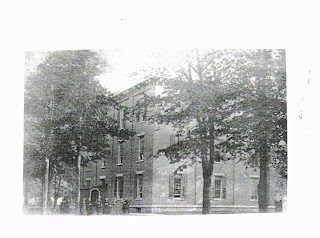Tonight was my first experience using Livestream. When the Abraham Lincoln Presidential Library and Museum announced the performance of Mary Todd Lincoln's retrial would be on live web cast for non-attendees, I immediately knew this was something I desired to witness.
 |
| Library of Congress Digital Collection |
Much to my surprise, the issue at hand at the original court trial was not to declare if she was insane, the jury had the burden to declare if Mary Todd Lincoln should be admitted involuntarily for inpatient treatment by law. This verdict itself would carry the status of insanity for a period of one year, even if treatment ceased prior.
Many of the testimonies brought before the court were from third parties by the public which were never verified. In addition, many of the medical testimonies made by the physicians, were made by those that today would not be considered specialists in the mental health field.
In addition, several of the medical testimonies were made by physicians that had not even examined Mary Todd Lincoln recently before giving their expert opinions. Some of the Doctors had not seen Mary for several years prior to filing their report.
What was most concerning was that Mary herself did not feel she suffered from any mental illness. However, the responsibility of the jury was to make a verdict on two factors:
1. Could she care for herself and her affairs.
2. Was she at risk to cause injury to herself or anyone else.
In the retrial held on Oct. 1, 2012 at Springfield, IL, a modern day jury declared by majority vote that Mary Todd Lincoln was not subject to mandatory involuntary treatment by law, but the vote was not unanimous.
If you have the opportunity to view this broadcast, I hope you will take the time to view this program. It brings to light the loose drug regulations where opium based products were available over the counter. While Mary's physicians recommended them, there was little dispensing regulations at that time. It is unclear if any of Mary's symptoms were caused by ingestion of such drugs or if her prolonged grief was at play.
Mary reported hearing voices and having visions of her immediate family that she so tragically lost. Such occurrences can be considered a normal part of the grieving process.
Mary did display many erratic behaviors. She equated the act of shopping to help her feel the emotion of happiness, she constantly worried that another tragedy would take her only surviving son. There is no doubt that her son wanted what was best for her. Unfortunately this period offered very few options for mental health needs.
There is no doubt that Mary Todd Lincoln suffered great periods of anxiety and was known to suffer migraines after a carriage accident, but her analogy in describing that pain may have been construed abnormal, likely because she was an educated woman with great verbal vocabulary.
On all accounts, the experts felt Mary Todd Lincoln suffered a variety of mental symptoms that exhibited signs of mental illness. However, she was convicted without proper medical examinations and the use of evidence that could not be cross examined.
My final thoughts is that observing this re-trial made me aware just how far we have come with understanding and having compassion for mental health issues in today's society. My personal opinion was that Mary did suffer mental illness but that in itself does not equate to being insane. She experienced psychotic episodes that today we often treat successfully on an outpatient bases. Mental illness carried tremendous stigma in her day and one would have to question if her denial of her condition was more from the social implication than irrationality.
The Abraham Lincoln Presidential Library and Museum also has plans to present similar re-trials including the case of Joseph Smith the Mormon profit, so stay tuned to their facebook page for details.
I extend my gratitude to the Abraham Lincoln Presidential Library and Museum and Livestream for making this program available to us.














